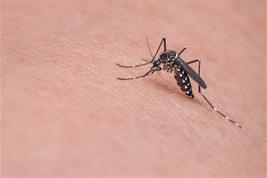21.02.2023

High summer temperatures, mild winters and changing precipitation: Climate change is increasing the risk that exotic mosquitoes and the viruses they transmit will also occur in Germany. The interdisciplinary research project "CuliFo 3" started its third round on February 16 with a kick-off meeting in the historic lecture hall of the Bernhard Nocht Institute for Tropical Medicine. The Leibniz Center for Agricultural Landscape Research (ZALF) is involved as one of five partner institutions.
The research project focuses on the spread of various mosquito species in Germany and their ability to transmit so-called arboviruses such as the West Nile virus or the Usutu virus to humans. "CuliFo" stands for research (in German “Forschung”) on mosquitoes (in Latin: Culicidae). CuliFo 3 continues the research work on the spread of mosquito species and viruses transmissible by them in Germany. It builds on the findings of the previous BLE-funded research projects "CuliMo" on mosquito monitoring, as well as CuliFo and CuliFo2.
The continuation project CuliFo 3 aims to focus even more on how insect-specific viruses and arboviruses in mosquitoes interact and what this means for their ability to infect animals and humans. In addition, the researchers want to find out the minimum infectious dose needed for mosquitoes to transmit arboviruses and maintain cycles of infection. The collaborative also wants to investigate which environmental conditions favor outbreaks. The environmental conditions studied include abiotic and biotic influencing factors such as temperature, precipitation, habitat or landscape structure. The researchers hope to use these data to model outbreak scenarios in order to develop environmentally sound and sustainable control strategies. The researchers hope to use these data to establish an early warning system for arbovirus disease outbreaks.
Research partners:
- Bernhard Nocht Institute for Tropical Medicine (BNITM) (coordination)
- Friedrich-Loeffler-Institute, Federal Research Institute for Animal Health (FLI) (coordination)
- Leibniz Center for Agricultural Landscape Research (ZALF)
- Carl-von-Ossietzky-University (CvO)
- Society for the Promotion of Mosquito Control (GFS) e.V.
- Fraunhofer Institute for Cell Therapy and Immunology (IZI)
